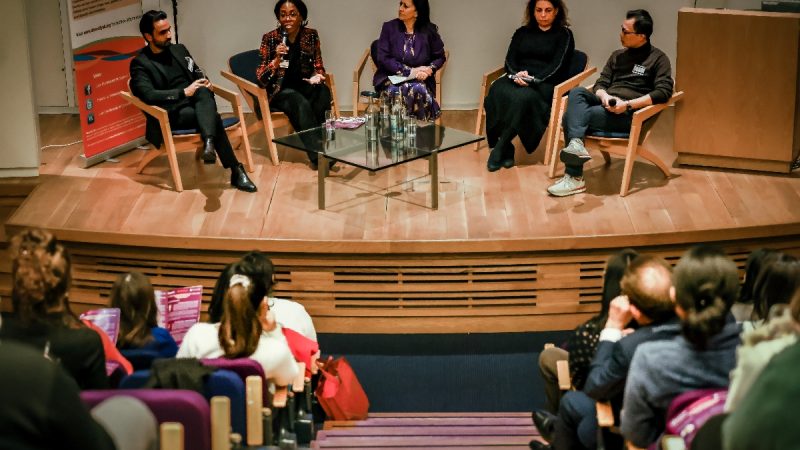Women on Boards 2014: 3 years on, the target is in sight

Lord Davies of Abersoch has today (26 March 2014) published the third annual progress report into Women on Boards. Three years on from the ground-breaking review in 2011, Lord Davies and his steering group report a growing number of women in decision-making roles with the initial target of 25% by 2015 in sight. The latest figures today, published at the same time as the Cranfield University School of Management’s Female FTSE Board report, show that women now account for 20.7% of board positions in the FTSE100 – up from 12.5% in 2011 and 17.3% in April 2013. Lord Davies originally set a target in 2011 of achieving 25% in 2015.
There continues to be real progress made with more women than ever before in the boardroom of the UK’s top companies and a growing recognition of the benefits gained by business, the economy and wider society.
Lord Davies, speaking ahead his speech at Barclays, sponsors of the Cranfield report, on 26 March, said: "The rate of change that we have seen at the heart of our biggest companies over the last 3 years has been impressive. The voluntary approach is working and companies have got the message that better balanced boards bring real business benefits. We are finally seeing a culture change taking place at the heart of British business."
"However, the eyes of the world are on us as we enter the home straight. They are judging us as to whether the voluntary approach, rather than regulation, will work – we need to now prove we can do this on our own."
Only 48 more women needed to meet FTSE100 gender target
Business Secretary Vince Cable said: "These latest figures show that businesses are getting the right mix of talent around their boardroom table and understand the importance of this. Ninety eight of the FTSE100 boards are now made up of at least 1 woman and we need fewer than 50 new women appointments to FTSE100 boards to reach our target of 25% of women on all FTSE100 boards in the next year. This is a huge improvement from where we started just 3 years ago."
"But we will only achieve this if there is a renewed, concentrated effort by Chairs and CEOs to continue to change the make up of management at their top table. More needs to done to improve the number of women in executive positions. These will be the CEOs of tomorrow and businesses still aren’t tapping into the vast talent pool available to them."
Minister for Women and Equalities Maria Miller said: "The workplace was designed by men for men. Women don’t need special treatment they just need a modernised workplace that gives them a level playing field. Supporting women to fulfil their full potential should be a core business issue; not just so we can reach our target of 25% of female appointments to FTSE100 boards by next year (2015), but for the long term sustainability of our economy."
As of 3 March 2014, in the FTSE100:
- women now account for 20.7% of overall board directorships, up from 17.3% in April 2013
- of this, women account for 25.5% of non-executive directorships and 6.9% of executive dirctorships
- women account for 231 of the 1,117 FTSE100 board positions
- women account for 28% of all board appointments in 2013/14
- there remain 2 all-male boards – Glencore Xstrata and Antofagasta
- fewer than 50 new women appointments need to be made to reach the 25% target
In the FTSE 250 the figures show:
- women now account for 15.6% of overall board directorships, up from 13.2% in 2013
- of this, women account for 19.6% of non-executive directorships and 5.3% of executive directorships
- women account for 33% of all board appointments in 2013/14 there remain 48 all-male boards
The latest report shows that more and more FTSE Chairs are convinced of the value of women in boardroom. Twelve companies in the FTSE100 have 4 or more women in the boardroom, with 27 having more than 2. The report also shows that companies are setting themselves challenging targets while the pipeline continues to be strengthened.
Other notable developments include:
- two new FTSE100 female Chief Executives – Liv Garfield at Severn Trent and Moya Greene at Royal Mail Group. The current number stands at 4
- Fiona Woolf appointed as only the second ever female Lord Mayor of the City of London
- Lloyd’s of London appointing their first female Chief Executive – Inga Beale
- Old Mutual appointing two female directors, with 4 out of the 12 director positions held by women
- Lloyds Banking Group pledging that 40% of its top 5,000 jobs will be occupied by women within 6 years
- ministers holding a number of sector roundtables with representatives of the FTSE350 over the past 9 months
Click to download a copy of Lord Davies Women on Board Annual Report 2014.




